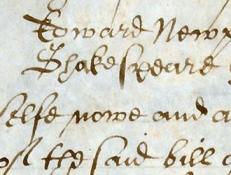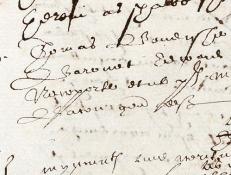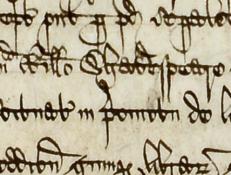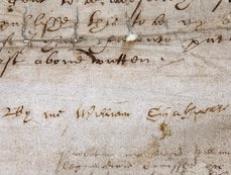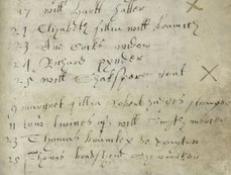To view a sortable list, please visit the Resource
All Documents
September 5, 1614
In late August/early September 1614, it became generally known that plans were afoot to enclose some of the open fields at Welcombe, to the northeast of Stratford.
October 28, 1614
Within two months of it becoming common knowledge that plans were afoot to enclose some of the open fields at Welcombe to the north-east of Stratford, Shakespeare took steps to ensure that his income as a leaseholder of half the tithes of Old Stratford, Bishopton and Welco
1613- 1614
In March 1613 William Shakespeare and three associates agreed to purchase the Gatehouse of the former Dominican priory in London known as “Blackfriars” from Henry Walker for the sum of £140. The indenture of bargain and sale is dated March 10.
1613- 1614
In March 1613 William Shakespeare and three associates agreed to purchase the Gatehouse of the former Dominican priory in London known as “Blackfriars” from Henry Walker for the sum of £140. The indenture of bargain and sale is dated March 10.
April 26 and May 5, 1615
In 1613 William Shakespeare, with the assistance of three trustees, purchased the gatehouse in the Blackfriars neighborhood of London, evidently as an investment.
May 22, 1615
In 1613 William Shakespeare, with the assistance of three trustees, purchased the gatehouse in the Blackfriars neighborhood of London, evidently as an investment.
October 9, 1615
Ostler v. Heminges, a lawsuit regarding shares in the Globe and Blackfriars playhouses, is remarkable for two reasons.
November 17, 1614 - September 1615
Thomas Greene, the Corporation’s steward, recorded in some detail the events associated with the contentious proposals to enclose some of the open fields at Welcombe.
March 25, 1616
William Shakespeare’s last will and testament provides one of the richest surviving accounts for understanding his familial and professional networks.
April 25, 1616
According to the inscription on the wall monument erected in his memory, Shakespeare died on April 23, 1616 and was buried, as would be normal practice at that time, two days later.





